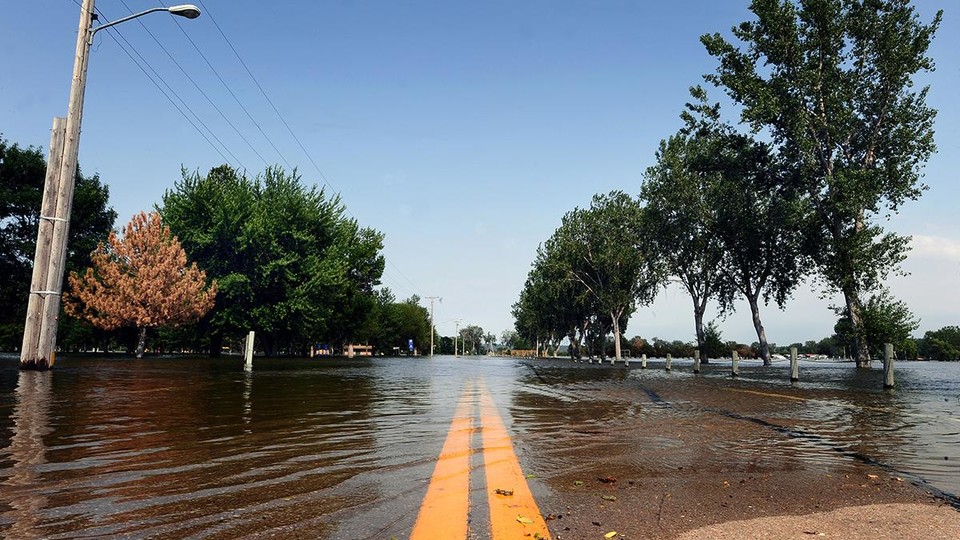· 6 min read
Public Policy Center aids new mental health initiatives

The flood waters that washed over the state more than a year ago in March 2019 have long receded, but impacts are still rippling through many Nebraska communities.
In response to the ongoing challenges across the state — particularly the mental health toll on impacted citizens — the University of Nebraska’s Public Policy Center has partnered with four Behavioral Health Regions on two new mental health initiatives.
These disaster response projects are made possible by new grant funding of nearly $2 million from the federal government’s Substance Abuse and Mental Health Services Administration. The initiatives aim to serve both children and adults, and build on previous work done to help communities thrive again after the historic flooding.
Stacey Hoffman, senior research manager at the Public Policy Center, worked directly with two Behavioral Health Regions in the state to secure the funding, but the two grants will be dispersed through 23 counties each. The grants officially began April 30.
The first grant, in the amount of $999,627, focuses on schools, and aims to serve children and their families by expanding existing behavioral health services in schools and utilizing those services to identify and serve students with behavioral health needs.
Grant partners on the school-focused grant are Region 6 Behavioral Healthcare, Region 3 Behavioral Health Services, Region 4 Behavioral Health System, Nebraska School Community Intervention Program and the Public Policy Center. The counties covered by the grant are Antelope, Boone, Boyd, Buffalo, Burt, Cass, Colfax, Cuming, Custer, Dodge, Douglas, Hall, Holt, Howard, Knox, Madison, Nance, Pierce, Platte, Sarpy, Stanton, Thurston and Washington.
“The grant will aid in delivering some direct therapeutic interventions through schools for students who need something immediately, and expanding existing linkages, which includes training people and putting in place programs in the schools to help link students to services and provide information to families,” Hoffman said.
The training of school employees, including teachers and administrators, will strengthen their knowledge of the mental health impacts of disasters and how they can best serve their students.
In-school teams will be identified and trained and emotional/behavioral navigators will provide referrals to mental health services. Youth Mental Health First Aid training of trainers, training in Mindful Schools K-12 Facilitation and the School Community Intervention and Prevention annual conference will be utilized as well.
“We have a lot of training built in so that these efforts can be sustained beyond the time period of the grant,” Hoffman said. “This will be important moving forward, especially since the spread of COVID-19 is also impacting communities.
“Students will be assessed and linked to resources as needed. The schools may not know whether a student’s behavior is related to what they experienced during the flooding or not, but if we get them into services and find out what some of the underlying causes of their behaviors are, those behaviors can be appropriately addressed.”
Patti Jurjevich, regional administrator for Region 6 Behavioral Healthcare, which is comprised of Cass, Dodge, Douglas, Sarpy and Washington counties, said many in the state are still feeling significant effects from the flooding, and that it is important to include children in the response, especially in a time when a global pandemic has added further uncertainty.
“This is a unique opportunity to approach this in what feels like a very comprehensive way, by helping support youth and their families and school personnel to address what are continued stressors in those communities due to the flooding,” Jurjevich said. “And now we’re layering on this pandemic, which, you know, is an additional stressor for people.”
The spread of COVID-19 has shut down schools, but Jurjevich said the training provided through the grant will be done in accordance with local health restrictions as the project moves forward.
The second disaster response grant will provide services to adults who have been directly impacted and have mental health or substance abuse issues. The grant, in the amount of $999,968, was dispersed to Region V Systems, but includes Region 3 Behavioral Health Services, Region 4 Behavioral Health System, Nebraska Rural Response Hotline, and the Public Policy Center. Counties covered are Antelope, Boone, Boyd, Buffalo, Burt, Butler, Colfax, Cuming, Custer, Hall, Holt, Howard, Knox, Madison, Nance, Nemaha, Pierce, Platte, Richardson, Saline, Saunders, Stanton and Thurston.
Hoffman said this grant will extend mental health access by providing trainings to recognize and respond to adults with behavioral health issues, educate the workforce on disaster-related mental health issues, and provide treatment vouchers to those within impacted areas. Those seeking help will be connected to a mental health professional through the Nebraska Rural Response Hotline.
“We’ve already worked with Rural Response in the past on disaster-related grants and it seems to work very well,” Hoffman said. “We can get people connected with the network of providers that have signed up.”
The grant also builds on the success of the Nebraska Strong Recovery Project, spearheaded by the Public Policy Center’s Denise Bulling, to continue outreach within communities by trained crisis counselors who can also identify and connect people needing help to resources provided by the new grant.
“It will be very similar, although scaled down,” Hoffman said. “There will be continued effort to educate communities about common reactions, what they might be seeing, and helping to link them to resources they still need after the flooding.
“We hear in, especially in the rural counties, that there’s still quite a bit of concern. There was a lasting impact in the rural counties from the flooding. And then they have this concern about the virus on top of that, so this is critically needed.”
Specialists at the Public Policy Center will continue to support the grant partners with their disaster response expertise and will act as evaluators for the grant.
“We were pleased to play a critical role in getting these funds for our state,” Hoffman said. “I’m just really happy to have them awarded. Our ongoing role is going to be as an evaluator for the grants, documenting the impacts of each grant. Evaluations like these are crucial to learning the impact of funding, and the federal government uses this information to determine what has been effective and that helps them decide what they want to fund in the future.”







